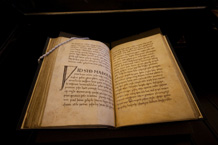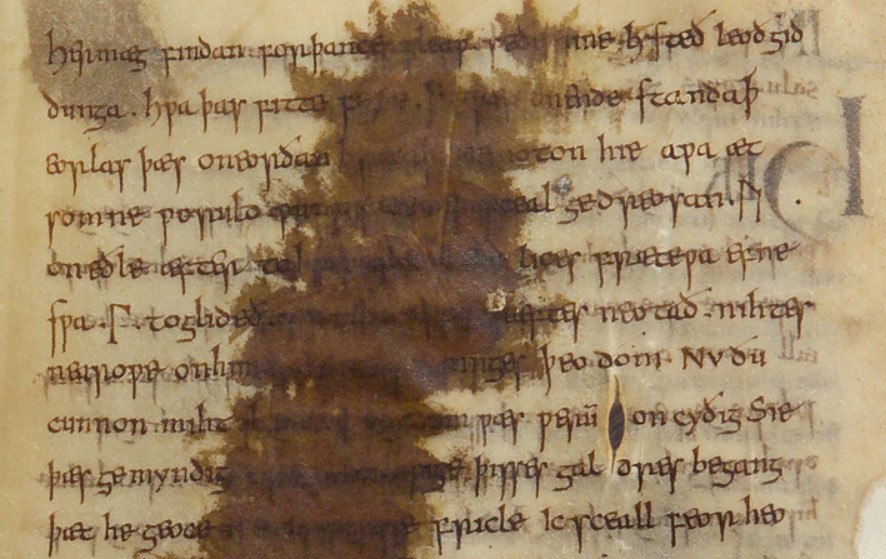|
CRIST
''Crist'' (Old English for ''Christ'') is the title of any of three Old English religious poems in the Exeter Book. They were during the late 9th and early 10th centuries believed to be a three-part work by a single author, but more recent scholarship has determined that the works are of differing origins. :'' Crist I'' (also ''Crist A'' or ''Advent Lyrics''), a poem in twelve sections on Christ's Advent written by an unknown author (or authors). :'' Crist II'' (also ''Crist B'' or ''The Ascension''), a poem on Christ's Ascension written by the Anglo-Saxon poet Cynewulf Cynewulf (, ; also spelled Cynwulf or Kynewulf) is one of twelve Old English poets known by name, and one of four whose work is known to survive today. He presumably flourished in the 9th century, with possible dates extending into the late 8th .... :'' Crist III'' (also ''Crist C''), a poem on the Last Judgment written by an unknown author. External links {{Wikisource The Old English poems, ''Christ I-III''A ... [...More Info...] [...Related Items...] OR: [Wikipedia] [Google] [Baidu] |
Old English
Old English (, ), or Anglo-Saxon, is the earliest recorded form of the English language, spoken in England and southern and eastern Scotland in the early Middle Ages. It was brought to Great Britain by Anglo-Saxon settlement of Britain, Anglo-Saxon settlers in the mid-5th century, and the first Old English literature, Old English literary works date from the mid-7th century. After the Norman conquest of 1066, English was replaced, for a time, by Anglo-Norman language, Anglo-Norman (a langues d'oïl, relative of French) as the language of the upper classes. This is regarded as marking the end of the Old English era, since during this period the English language was heavily influenced by Anglo-Norman, developing into a phase known now as Middle English in England and Early Scots in Scotland. Old English developed from a set of Anglo-Frisian languages, Anglo-Frisian or Ingvaeonic dialects originally spoken by Germanic peoples, Germanic tribes traditionally known as the Angles, Sa ... [...More Info...] [...Related Items...] OR: [Wikipedia] [Google] [Baidu] |
Poem
Poetry (derived from the Greek ''poiesis'', "making"), also called verse, is a form of literature that uses aesthetic and often rhythmic qualities of language − such as phonaesthetics, sound symbolism, and metre − to evoke meanings in addition to, or in place of, a prosaic ostensible meaning. A poem is a literary composition, written by a poet, using this principle. Poetry has a long and varied history, evolving differentially across the globe. It dates back at least to prehistoric times with hunting poetry in Africa and to panegyric and elegiac court poetry of the empires of the Nile, Niger, and Volta River valleys. Some of the earliest written poetry in Africa occurs among the Pyramid Texts written during the 25th century BCE. The earliest surviving Western Asian epic poetry, the ''Epic of Gilgamesh'', was written in Sumerian. Early poems in the Eurasian continent evolved from folk songs such as the Chinese ''Shijing'', as well as religious hymns (the Sanskrit ' ... [...More Info...] [...Related Items...] OR: [Wikipedia] [Google] [Baidu] |
Exeter Book
The Exeter Book, also known as the Codex Exoniensis or Exeter Cathedral Library MS 3501, is a large codex of Old English poetry, believed to have been produced in the late tenth century AD. It is one of the four major manuscripts of Old English poetry, along with the Vercelli Book in Vercelli, Italy, the Nowell Codex in the British Library, and the Junius manuscript in the Bodleian Library in Oxford. The book was donated to what is now the Exeter Cathedral library by Leofric, the first bishop of Exeter, in 1072. It is believed originally to have contained 130 or 131 leaves, of which the first 7 or 8 have been replaced with other leaves; the original first 8 leaves are lost. The Exeter Book is the largest and perhaps oldest known manuscript of Old English literature, containing about a sixth of the Old English poetry that has come down to us. In 2016, UNESCO recognized the book as "the foundation volume of English literature, one of the world's principal cultural artefa ... [...More Info...] [...Related Items...] OR: [Wikipedia] [Google] [Baidu] |
Christ I
''Christ I'' (also known as ''Christ A'' or (''The'') ''Advent Lyrics''), is a fragmentary collection of Old English poems on the coming of the Lord, preserved in the Exeter Book. In its present state, the poem comprises 439 lines in twelve distinct sections. In the assessment of Edward B. Irving Jr, "two masterpieces stand out of the mass of Anglo-Saxon religious poetry: ''The Dream of the Rood'' and the sequence of liturgical lyrics in the Exeter Book ... known as ''Christ I''". The topic of the poem is Advent, the time period in the annual liturgical cycle leading up to the anniversary of the coming of Christ, a period of great spiritual and symbolic significance within the Church — for some in early medieval Europe a time of fasting, and the subject of a sermon by Gregory the Great (590-604 CE). The Old English lyrics of ''Christ I'', playing off the Latin antiphons, reflect on this period of symbolic preparation. Manuscript and associated texts ''Christ I'' is found on ... [...More Info...] [...Related Items...] OR: [Wikipedia] [Google] [Baidu] |
Christ II
''Christ II'', also called ''The Ascension'', is one of Cynewulf's four signed poems that exist in the Old English vernacular. It is a five-section piece that spans lines 440–866 of the Christ triad in the ''Exeter Book'' (folios 14a-20b), and is homiletic in its subject matter in contrast to the martyrological nature of ''Juliana'', ''Elene'', and ''Fates of the Apostles''. ''Christ II'' draws upon a number of ecclesiastical sources, but it is primarily framed upon Gregory the Great’s ''Homily XXIX'' on Ascension Day. The poem is assigned to a triad of Old English religious poems in the Exeter Book, known collectively as ''Christ''. ''Christ'' comprises a total of 1664 lines and deals with Christ's Advent, Ascension and Last Judgment. It was originally thought to be one piece completed by a single author, but the poem is now broken up into three parts. Background The poem ''Christ'' was originally thought to be one piece completed by a single author. Almost all scholars n ... [...More Info...] [...Related Items...] OR: [Wikipedia] [Google] [Baidu] |
Cynewulf
Cynewulf (, ; also spelled Cynwulf or Kynewulf) is one of twelve Old English poets known by name, and one of four whose work is known to survive today. He presumably flourished in the 9th century, with possible dates extending into the late 8th and early 10th centuries. Known for his religious compositions, Cynewulf is regarded as one of the pre-eminent figures of Anglo-Saxon Christian poetry. Posterity knows of his name by means of runic signatures that are interwoven into the four poems which comprise his scholastically recognized corpus. These poems are: ''The Fates of the Apostles'', ''Juliana'', ''Elene'', and ''Christ II'' (also referred to as ''The Ascension''). The four signed poems of Cynewulf are vast in that they collectively comprise several thousand lines of verse. In comparison, the one work attributed to Cædmon, ''Cædmon's Hymn'', is quite succinct at nine lines. Life Dialect Some basic statements can be made by examining such aspects as the spellings of his ... [...More Info...] [...Related Items...] OR: [Wikipedia] [Google] [Baidu] |
Christ III
''Christ III'' is an anonymous Old English religious poem which forms the last part of ''Christ'', a poetic triad found at the beginning of the Exeter Book. ''Christ III'' is found on fols. 20b–32a and constitutes lines 867–1664 of ''Christ'' in Krapp and Dobbie's ''Anglo-Saxon Poetic Records'' edition. The poem is concerned with the Second Coming of Christ (''parousia'') and the Last Judgment. Sample This passage, about fire engulfing the world at Judgement Day, gives a modern English translation of Christ III, lines 993–1013 (in the line-numbering of the Anglo-Saxon Poetic Records The Anglo-Saxon Poetic Records (ASPR) is a six-volume edition intended at the time of its publication to encompass all known Old English poetry. Despite many subsequent editions of individual poems or collections, it has remained the standard refere ...): Other Old English eschatological poems * Blickling Homily nos. 7 and 10 *''Judgement Day I'' *''Judgement Day II'' Editions and translati ... [...More Info...] [...Related Items...] OR: [Wikipedia] [Google] [Baidu] |

.jpg)

